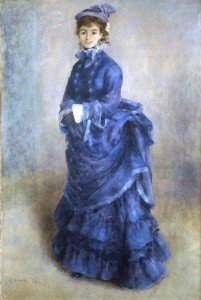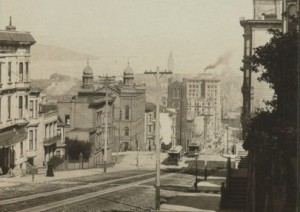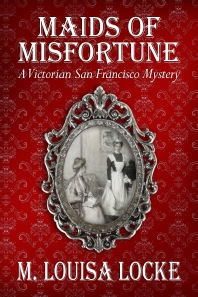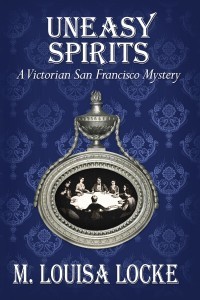M. Louisa Locke on Flawed Heroines
from Maids of Misfortune and
by M. Louisa Locke
 When I was asked to write about flawed heroines, I immediately thought of Annie Fuller, the main protagonist in my two cozy Victorian mysteries, Maids of Misfortune and Uneasy Spirits. Annie is a young widow who lives in 1879 San Francisco and supplements her income as a boarding house owner by giving advice as the clairvoyant Madam Sibyl. As befitting cozy mysteries, my characters and plots don't tend to be too dark, and even my hero (Annie's romantic interest, lawyer Nate Dawson) isn't a typical tortured bad boy in need of reform. But Annie does have her weaknesses, and her extreme independence (or perhaps her fear of being dependent) is the most obvious character flaw because it gets her into the greatest difficulties in both books and leads to a kind of recklessness in her behavior.
When I was asked to write about flawed heroines, I immediately thought of Annie Fuller, the main protagonist in my two cozy Victorian mysteries, Maids of Misfortune and Uneasy Spirits. Annie is a young widow who lives in 1879 San Francisco and supplements her income as a boarding house owner by giving advice as the clairvoyant Madam Sibyl. As befitting cozy mysteries, my characters and plots don't tend to be too dark, and even my hero (Annie's romantic interest, lawyer Nate Dawson) isn't a typical tortured bad boy in need of reform. But Annie does have her weaknesses, and her extreme independence (or perhaps her fear of being dependent) is the most obvious character flaw because it gets her into the greatest difficulties in both books and leads to a kind of recklessness in her behavior.
But as soon as I had that thought, I felt that I had wronged my own creation. How could I call Mrs. Fuller's fiercely independent spirit a flaw? Wasn't I just buying into the prevalent nineteenth century view, called by historians the "Cult of True Womanhood," that said a middle class woman like Mrs. Fuller should be pious, pure, domestic and submissive? Was Annie Fuller truly flawed because she refused to confine herself to the narrow definitions of womanly behavior in that period-particularly the submissive part?
I had consciously made her independent, modeling her on many of the real heroines of the nineteenth century, women like Elizabeth Cady Stanton, Susan B. Anthony, Lucy Stone, and Jane Addams who had challenged the idea that women needed to be dependent and subordinate to men. I purposely gave her a childhood, mirroring the childhood of many of these historic women, that had fostered her sense of competence and equality. Annie Fuller's mother died when she was young and, as a result, she became very close to her father, who treated her like a son and trained her to develop an extraordinary understanding of business and stock speculation. Elizabeth Cady Stanton, for example, had become a surrogate son to her lawyer father when his last remaining male heir died.
 And, for Annie, like many of the women's rights leaders of the nineteenth century, entry into adulthood became a rude awakening and threatened her of sense of confidence and independence. In Annie's case her crisis came with her marriage to a man who belittled and abused her and eventually destroyed her fortune and left her destitute upon his death. What followed was five humiliating years living off the reluctant charity of her in-laws, a not uncommon fate for widowed women of that time. No wonder economic independence would become so important to her. She worked to achieve that independence when she turned an old San Francisco house she inherited into a boarding house. Then, when that income was insufficient, she created the role of Madam Sibyl and developed a lucrative practice as a clairvoyant, using the expertise she had gotten under her father's tutelage to dispense business advice.
And, for Annie, like many of the women's rights leaders of the nineteenth century, entry into adulthood became a rude awakening and threatened her of sense of confidence and independence. In Annie's case her crisis came with her marriage to a man who belittled and abused her and eventually destroyed her fortune and left her destitute upon his death. What followed was five humiliating years living off the reluctant charity of her in-laws, a not uncommon fate for widowed women of that time. No wonder economic independence would become so important to her. She worked to achieve that independence when she turned an old San Francisco house she inherited into a boarding house. Then, when that income was insufficient, she created the role of Madam Sibyl and developed a lucrative practice as a clairvoyant, using the expertise she had gotten under her father's tutelage to dispense business advice.
Not surprisingly, when her economic independence is threatened at the opening of Maids of Misfortune, Annie Fuller is willing to do almost anything to counter that threat, including investigating the death of one of Madam Sibyl's clients, whose assets, including a bequest to Annie, has gone missing. However, her fierce independence, taken too far, also becomes a weakness. In her single-minded determination to remain economically independent, she acts rashly, not thinking of the consequences of those actions. As a result, in the course of her investigations, people's freedom, in some cases their very lives, are jeopardized. Yet she refuses to listen to counsel, particularly when given by Nate Dawson, because she sees his actions in the light of the other men in her life who tried to make her submit to their will. She has confused being dependent with being open to help from someone else.
 While some readers have grumbled that these struggles between the hero and heroine in my books make Annie too modern, as a professional historian of nineteenth century women, I can assure readers that Annie's fear of dependence was very common. Some women, Like Susan B. Anthony and Sarah Grimke, refused offers of marriage for that very reason. Others, like Lucy Stone, tried to carve out marriages of equality, changing the marriage vows, keeping their own names. Other women challenged public opinion by winning a divorce, as did Laura de Force Gordon, a minor but real historical character in my second book, Uneasy Spirits.
While some readers have grumbled that these struggles between the hero and heroine in my books make Annie too modern, as a professional historian of nineteenth century women, I can assure readers that Annie's fear of dependence was very common. Some women, Like Susan B. Anthony and Sarah Grimke, refused offers of marriage for that very reason. Others, like Lucy Stone, tried to carve out marriages of equality, changing the marriage vows, keeping their own names. Other women challenged public opinion by winning a divorce, as did Laura de Force Gordon, a minor but real historical character in my second book, Uneasy Spirits.
While Annie Fuller's independent nature is understandable, it leads to a fear of dependence in Uneasy Spirits that almost proves her undoing. In this, the second book in the series, she not only pushes Nate away because of her fear that she would lose her independence if she married him, but she pushes away all her friends when she feels they might question her decisions. What she achieves is not independence but a growing isolation, which will ultimately result in threats to her own life.
 While I have Annie realize some of the ways her behavior has hurt her and others at the end of Uneasy Spirits, I don't think that the problems she face will go away, particularly regarding her relationship with Nate. Nate Dawson, as a man of his time, thinks of his offer of marriage as gift-giving Annie economic security, protection, respectability, a home and family. By in large her friends, including her female friends, agree with him. Annie, on the other hand, fears that marriage will cause her to lose things, her name, her freedom of action, her work, and, most frightening of all, her independence. Whether these different views of marriage can be reconciled will have to be answered in subsequent books in the series, but you can believe me, as Annie's creator, I am not going to squash her reckless and independent spirit, because where would be the fun in that!
While I have Annie realize some of the ways her behavior has hurt her and others at the end of Uneasy Spirits, I don't think that the problems she face will go away, particularly regarding her relationship with Nate. Nate Dawson, as a man of his time, thinks of his offer of marriage as gift-giving Annie economic security, protection, respectability, a home and family. By in large her friends, including her female friends, agree with him. Annie, on the other hand, fears that marriage will cause her to lose things, her name, her freedom of action, her work, and, most frightening of all, her independence. Whether these different views of marriage can be reconciled will have to be answered in subsequent books in the series, but you can believe me, as Annie's creator, I am not going to squash her reckless and independent spirit, because where would be the fun in that!
 M. Louisa Locke is a retired professor of U.S. and Women's History, who has embarked on a second career as an historical fiction writer. The first two published books in her series of historical mysteries set in Victorian San Francisco, Maids of Misfortune and Uneasy Spirits, are bestsellers in the historical mystery category on Kindle. These books feature Annie Fuller, a boardinghouse owner and clairvoyant, and Nate Dawson, a San Francisco lawyer, who together investigate murders and other crimes, while her short stories, beginning with Dandy Detects, give secondary characters from this series a chance to get involved in their own minor mysteries. Dr. Locke is currently living in San Diego with her husband and assorted animals, where, in addition to these short stories, she is working on Bloody Lessons, the next full-length installment of her Annie Fuller/Nate Dawson series.
M. Louisa Locke is a retired professor of U.S. and Women's History, who has embarked on a second career as an historical fiction writer. The first two published books in her series of historical mysteries set in Victorian San Francisco, Maids of Misfortune and Uneasy Spirits, are bestsellers in the historical mystery category on Kindle. These books feature Annie Fuller, a boardinghouse owner and clairvoyant, and Nate Dawson, a San Francisco lawyer, who together investigate murders and other crimes, while her short stories, beginning with Dandy Detects, give secondary characters from this series a chance to get involved in their own minor mysteries. Dr. Locke is currently living in San Diego with her husband and assorted animals, where, in addition to these short stories, she is working on Bloody Lessons, the next full-length installment of her Annie Fuller/Nate Dawson series.
For more about M. Louisa Locke and her work, see http://mlouisalocke.com/. And for other great historical fiction ebooks, check out http://historicalfictionauthors.com/



